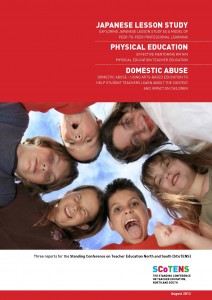Exploring Japanese research lessons study as a model of peer to peer professional learning
This study seeks to explore the use of Research Lesson Study (RLS), a long -established professional development strategy in Japan, as a model of school-based and peer-to-peer professional development for teachers which is new to Northern Ireland and the Republic. Broadly stated, RLS involves between 3-5 teachers forming a group that plans lessons, observes them being taught by each other and analyses them with a view to improving practice. There are various approaches to RLS but this proposal seeks to adapt the successful work of Dudley (2005), which was arguably the first formal application of RLS techniques for professional development anywhere in Ireland or the UK.
-established professional development strategy in Japan, as a model of school-based and peer-to-peer professional development for teachers which is new to Northern Ireland and the Republic. Broadly stated, RLS involves between 3-5 teachers forming a group that plans lessons, observes them being taught by each other and analyses them with a view to improving practice. There are various approaches to RLS but this proposal seeks to adapt the successful work of Dudley (2005), which was arguably the first formal application of RLS techniques for professional development anywhere in Ireland or the UK.
The focus of this small-scale study is to examine this relatively new professional learning tool in a secondary level school in Sligo and Belfast. The key research questions are:
- Can RLS offer an effective school-based and peer-to-peer approach to staff development in schools?
- What factors facilitate or hinder the improvement of pedagogy and ultimately learning through RLS?
Contacts
Professor John Gardner, Queen’s University Belfast
Mr Gerard Devlin, Queen’s University Belfast
Dr Debie Galanouli, Queen’s University Belfast
Dr Mary Magee, St Angela’s College, Sligo
Ms Kathryn McSweeney, St Angela’s College, Sligo
Effective mentoring within physical education teacher education
The aim of this research project is to:
- Prepare a summary of existing research on best practice in effective mentoring in the work place, within and beyond education
- Analyse three different models of mentoring in PETE (physical education teacher education) in three research sites, and to compare them with each other and the existing literature on effective mentoring.
- Provide an opportunity for mentors in the three research sites to comment on current practice and it identify gaps in their training and preparation for becoming an effective mentor.
- Prepare a position statement on effective mentoring in PETE, using the format of a collaborative seminar that can inform practice in the three research sites, underpin joint research publications and provide a rationale for further collaborative research.
Contacts
Dr Fiona C Chambers, University College Cork
Mr Walter Bleakley, University of Ulster at Jordanstown
Dr Deirdre Brennan, University of Ulster at Jordanstown
Children exposed to domestic abuse
Helping student teachers understand their role in primary school settings
This research project will undertake an audit in the participating institutions to identify the extent to which the topic of domestic abuse is included in the undergraduate education curriculum. Results from the audit will be used to inform the development and evaluation of a tailored education programme with student teachers. The aim of the education programme is to increase student teachers knowledge and understanding of domestic abuse and the impact it has on primary school aged children’s learning, development, behaviour and relationships within an educational context. The use of actors in the education programme provides an opportunity to address real life situations in a safe environment.
